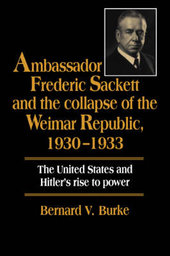
|
Ambassador Frederic Sackett and the Collapse of the Weimar Republic, 1930-1933
Paperback / softback
Main Details
| Title |
Ambassador Frederic Sackett and the Collapse of the Weimar Republic, 1930-1933
|
| Authors and Contributors |
By (author) Bernard V. Burke
|
| Physical Properties |
| Format:Paperback / softback | | Pages:348 | | Dimensions(mm): Height 229,Width 152 |
|
| Category/Genre | European history
World history - from c 1900 to now |
|---|
| ISBN/Barcode |
9780521533119
|
| Classifications | Dewey:327.73043 |
|---|
| Audience | | Professional & Vocational | |
|---|
| Illustrations |
3 Tables, unspecified
|
|
Publishing Details |
| Publisher |
Cambridge University Press
|
| Imprint |
Cambridge University Press
|
| Publication Date |
30 January 2003 |
| Publication Country |
United Kingdom
|
Description
This book details the attempts of American Ambassador Frederic Sackett to save the Weimar Republic, achieve German nationalist goals, and thwart Adolf Hitler's drive to power. Very early in his tenure in Berlin, Sackett saw Hitler and the Nazis as a serious danger to the Weimar Republic and to peace in Europe. Although at first the American thought that misrule by incompetent and inefficient Nazis would pave the way for a communist state, in time he came to see Hitler as the real threat to democracy in Germany.
Reviews"...a lucid and fluent narrative/analysis of the events of Sackett's embassy into the bargain...[a] spledid piece of work." The International History Review "...a meticulously researched work that offers substantial insight into American involvement in Germany immediately prior to Hitler's accession. ...interesting and detailed...The reviewer heartily endorses this monograph." History "This is a carefully researched and balanced account... Burke has made a substantial contribution to our understanding of U.S. policy toward Germany in the final years of the Weimar Replublic." German Studies Review "...a first-rate study of Frederic Sackett, Herbert Hoover's ambassador to Germany. In the process, readers not only get insights into US policy concerning war debts, reparations, and disarmament, but also learn how the Western diplomatic corps--of which Sackett was an integral part--analyzed the decline of the Weimar Republic and Hitler's assumption of power. Few, if any, studies on US policy toward late Weimar Germany are so detailed. Thus, Burke has written a definitive work that fills a real gap." J.D. Doenecke, Choice
|